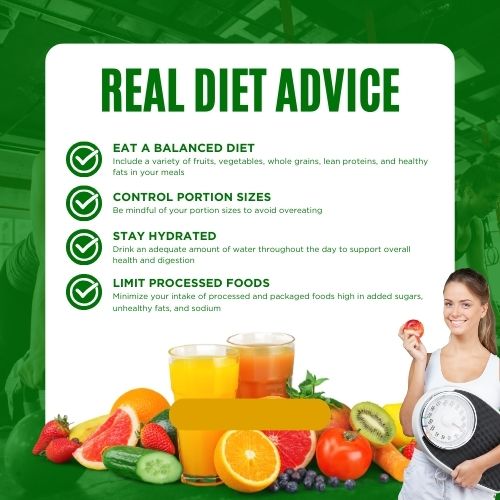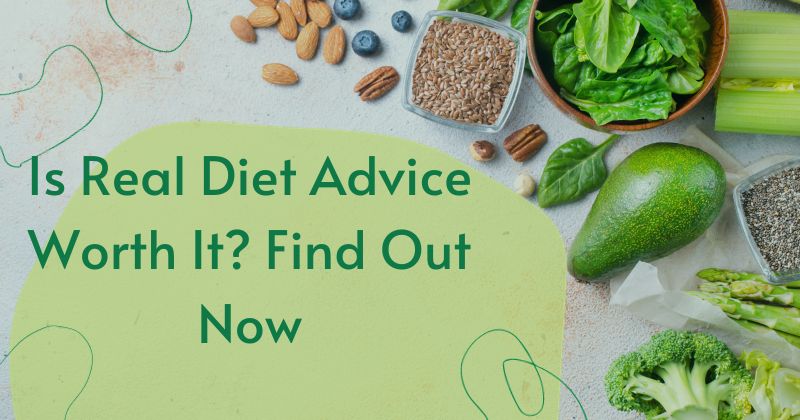Analyzing the effectiveness and potential outcomes of using real diet advice for optimal health, this article, titled “Is Real Diet Advice Worth It?”, delves into the complexities of today’s information landscape. In a world where information is readily available at our fingertips, it can be challenging to distinguish between genuine and misleading advice, especially when it comes to dieting and nutrition. With countless diets and weight loss fads circulating online, it’s crucial to question the validity and reliability of the information we encounter. This article aims to explore the value of real diet advice and whether it’s worth considering when making decisions about our health and well-being.
Is Real Diet Advice Worth It?
“Is Real Diet Advice Worth It?” is a question that resonates in an era flooded with conflicting nutritional information. The answer is a resounding yes. Opting for evidence-based guidance from qualified professionals not only ensures personalized and balanced nutritional plans but also promotes long-term health benefits. By steering clear of fad diets and focusing on scientifically-backed recommendations, we set ourselves on a path to improved well-being and a higher quality of life.
What is Real Diet Advice?
Before delving deeper into the topic, let’s define what real diet advice means. Real diet advice is evidence-based information provided by qualified professionals, such as registered dietitians or nutritionists, who rely on scientific research and studies to support their recommendations. Such advice is tailored to an individual’s specific needs, taking into account their health status, lifestyle, and goals.
On the other hand, the internet is inundated with fad diets, often propagated by self-proclaimed “nutrition experts” with no formal education or credentials. These diets might promise quick fixes and dramatic results, but they may lack scientific backing and can even be harmful to one’s health in the long run.
The Importance of Real Diet Advice
- Personalized Approach: Real diet advice considers the unique requirements of each individual. A qualified professional will assess factors like age, gender, activity level, medical history, and dietary preferences to design a personalized and sustainable eating plan.
- Evidence-Based: Dietitians and nutritionists base their recommendations on scientific evidence, ensuring that the advice they offer has a solid foundation in research and is more likely to lead to positive health outcomes.
- Balanced Nutrition: Real diet advice emphasizes a balanced intake of essential nutrients, ensuring that the body gets all the vitamins, minerals, and macronutrients it needs to function optimally.
- Long-Term Health: Unlike fad diets that often focus on short-term results, real diet advice takes into account long-term health goals, promoting overall well-being and reducing the risk of chronic diseases.

Common Misconceptions About Diet Advice
Before discussing whether real diet advice is worth it, let’s debunk some common misconceptions that often mislead people in their dietary choices:
| Misconception | Reality |
| One Size Fits All: There’s a universal “perfect” diet. | Reality: Nutrition needs vary from person to person based on factors like metabolism, activity level, and genetics. What works for one individual might not work for another. A personalized approach is essential for sustainable results. |
| Rapid Weight Loss is Best: Quick fixes lead to lasting results. | Reality: Rapid weight loss diets often involve severe calorie restriction, leading to nutrient deficiencies and muscle loss. Slow and steady progress is healthier and more sustainable in the long run. |
| Cutting Out Entire Food Groups is Good: Eliminating certain food groups is beneficial. | Reality: Unless medically necessary, cutting out entire food groups can lead to imbalances and deficiencies. A balanced diet that includes a variety of foods is generally recommended for good health. |
| Supplements Can Replace a Healthy Diet: Supplements are just as good as real food. | Reality: While supplements have their place, they can’t replace the benefits of whole foods. Real food provides a mix of nutrients, fiber, and other compounds that work together for better absorption and overall health. |
| Diet is the Only Factor: Diet is the sole determinant of health and weight. | Reality: While diet plays a significant role, other factors like physical activity, sleep, stress management, and genetics also influence health and weight. A holistic approach to well-being is crucial for optimal results. |
Is Real Diet Advice Worth It?
The question remains, is real diet advice worth the investment? The answer is a resounding yes. Here’s why:
- Health Benefits: Real diet advice is linked to numerous health benefits, such as improved heart health, better digestion, increased energy levels, and enhanced mood. Investing in your health today can save you from potential medical issues and costs in the future.
- Sustainability: Fad diets may offer quick results, but they are often unsustainable in the long run. Real diet advice promotes lasting lifestyle changes, ensuring that you can maintain your progress and not fall back into old habits.
- Avoiding Health Risks: Following unproven diets can lead to adverse health effects. Real diet advice, backed by scientific research, reduces the risk of nutritional deficiencies and imbalances, protecting your overall well-being.
- Maximizing Results: Real diet advice is tailored to your unique needs, maximizing the efficiency of your efforts. By understanding your body’s requirements, you can achieve your goals more effectively.
Key Takeaways
- Quality Matters: Seek advice from qualified professionals, such as registered dietitians or nutritionists, who provide evidence-based information tailored to your specific needs.
- Personalization is Key: Avoid one-size-fits-all approaches and embrace a diet plan that aligns with your lifestyle, preferences, and health goals.
- Be Patient: Sustainable results take time. Avoid falling for quick-fix promises and focus on making gradual, lasting changes to your diet and lifestyle.
- Holistic Approach: Remember that diet is just one aspect of overall health. Consider other factors like exercise, stress management, and sleep for a well-rounded approach to well-being.
Conclusion
In conclusion, the question “Is Real Diet Advice Worth It?” finds its answer in the undeniable value of investing in evidence-based nutritional guidance. Real diet advice is undoubtedly worth the investment. Making informed choices about what we eat directly impacts our health and quality of life. By seeking advice from qualified professionals and avoiding fad diets, we can embark on a journey of improved health and well-being that lasts a lifetime. This investment goes beyond mere numbers on a scale; it’s about enhancing your overall well-being, from mental clarity to physical stamina. It’s also a proactive step in reducing the risk of chronic diseases and potential future medical expenses. Furthermore, real diet advice offers a sustainable lifestyle change, not a quick fix that fizzles out, setting you up for long-term success. Lastly, remember that diet is just one piece of the puzzle; a holistic approach that includes exercise, sleep, and stress management is key to achieving optimal health.
FAQ
1. What Defines “Real Diet Advice,” and How Does It Differ from Fad Diets?
Answer: Real diet advice is evidence-based information provided by qualified professionals like registered dietitians or nutritionists. These experts rely on scientific research to offer personalized recommendations tailored to an individual’s health status, lifestyle, and goals. In contrast, fad diets often come from self-proclaimed “nutrition experts” with no formal education. These diets may promise quick fixes but lack scientific backing and can be harmful in the long run.
2. Why is Personalization Important in Diet Advice?
Answer: Personalization is crucial because each individual has unique requirements based on factors like age, gender, activity level, and medical history. A qualified professional will assess these factors to design a personalized and sustainable eating plan, ensuring that the advice is not just a one-size-fits-all solution but is genuinely tailored to you.
3. What Are Some Common Misconceptions About Dieting?
Answer: Some prevalent misconceptions include the idea that there’s a universal “perfect” diet, that rapid weight loss is best, and that cutting out entire food groups is beneficial. These myths can lead people astray, causing them to make choices that are not only ineffective but potentially harmful. Real diet advice debunks these myths, offering a balanced and evidence-based approach to nutrition.
4. Is Real Diet Advice Worth the Investment?
Answer: Yes, investing in real diet advice is worth it for several compelling reasons. It offers numerous health benefits like improved heart health and better digestion. It’s also sustainable, unlike fad diets that offer quick but temporary results. Moreover, real diet advice minimizes health risks by being backed by scientific research, ensuring that you’re not putting your well-being in jeopardy.
5. What Should I Consider for a Holistic Approach to Well-Being?
Answer: Diet is just one aspect of overall health. For a well-rounded approach to well-being, it’s essential to also consider other factors like exercise, stress management, and sleep. A holistic approach ensures that you’re not just focusing on food but are taking care of your body and mind in a comprehensive manner.
Reference Link for Further Study
- The Best Diet: Quality Counts – Harvard School of Public Health
- This article delves into the importance of food quality over mere caloric intake for optimal health and weight management.
Read more
- This article delves into the importance of food quality over mere caloric intake for optimal health and weight management.
- Evidence-Based Eating Guide – University of Cincinnati
- This guide serves as a checklist to inspire you to include some of the healthiest foods in your diet.
Read more
- This guide serves as a checklist to inspire you to include some of the healthiest foods in your diet.
- What Should I Eat? – Harvard T.H. Chan School of Public Health
- This article provides a summary of evidence-based, practical dietary advice, using the Healthy Eating Plate as a guide.
Read more
- This article provides a summary of evidence-based, practical dietary advice, using the Healthy Eating Plate as a guide.
- What’s the Healthiest Diet? – University of Southern California
- USC experts discuss the best ways to eat for optimal health, debunking myths and providing food guidelines.
Read more
- USC experts discuss the best ways to eat for optimal health, debunking myths and providing food guidelines.
- Nutrition and Healthy Eating – Mayo Clinic
- This resource offers a plethora of articles, tips, and quizzes to help you make informed decisions about your diet and nutrition.
Read more
- This resource offers a plethora of articles, tips, and quizzes to help you make informed decisions about your diet and nutrition.
Recommended Post For You
- Uncover the Best Diets for Seniors: Secrets to Aging Gracefully
- Master Your Meals: Real Diet Advice for Meal Planning
- Holistic Nutrition: Exploring the Connection Between Diet, Mind, and Body
- Mindful Eating: How to Cultivate a Healthy Relationship with Food Through Real Diet Advice
- Understanding Macro-nutrients: A Comprehensive Guide to Fueling Your Body for Optimal Health
- 10 Reasons You Need Real Diet Advice for a Healthier Life
- Real Diet Advice: Transformative Tips Beyond the Hype
